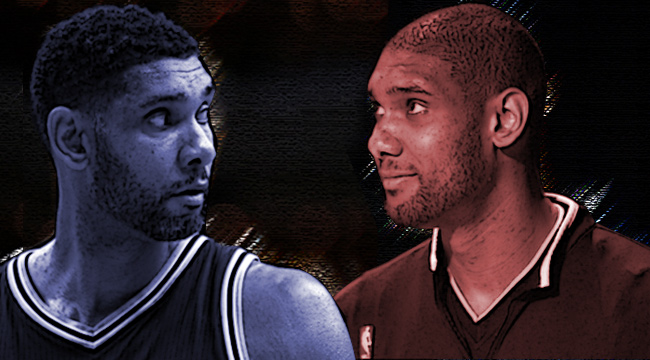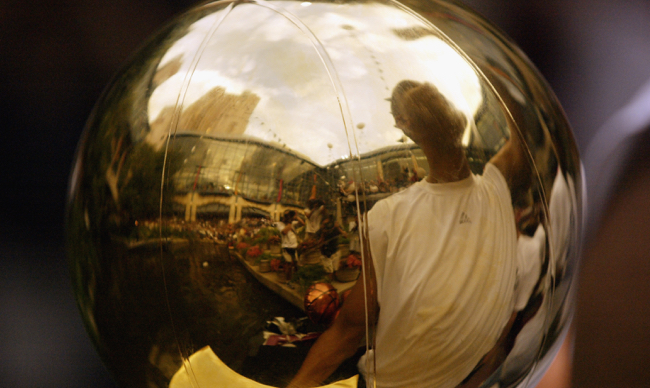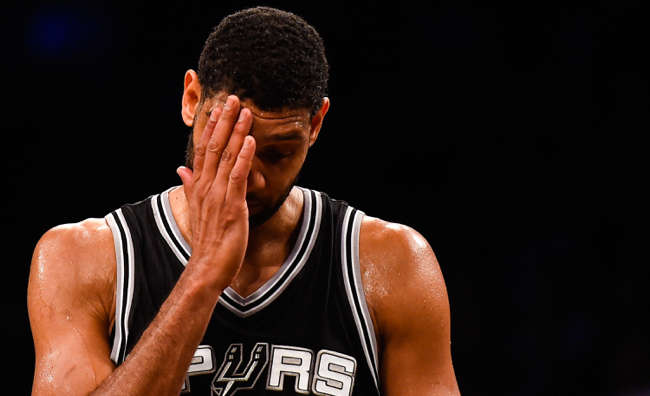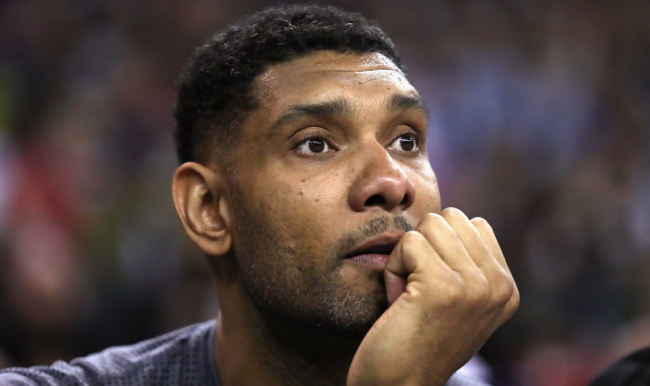
It’s hard to process Tim Duncan’s retirement. He’s become so ingrained in the public consciousness of basketball fans, there’s really nothing these pair of DIME scribes could do but exchange some emails that got really personal and also kind of annoying when the announcement finally came through.
That annoyance probably needs some explanation. Both of these basketball editors think Duncan is severely underrated when people talk about the NBA at the turn of the millennium. In discussions about all-time players, he’s getting passed over for Kobe Bryant and Shaquille O’Neal on that three-peat juggernaut in Los Angeles to begin the millennium.
These writers think Duncan’s career oeuvre speaks for itself. It has to because Tim Duncan certainly isn’t. He’s not even going to be at today’s press conference to announce his retirement; it’s perhaps the most Tim Duncan thing ever, that’s how synonymous with the understated he’s become.
So, here’s what they came up with. It’s part catharsis, part rambling diatribe about the media and Basketball Twitter; part essay on the greatness of a top-10 player of all time. It’s what you get when two Tim Duncan fans are suddenly thrust into the thankless position of writing about the end of a career that never seemed like it was going to end. Until it did.
Jack Winter
I used to hate Tim Duncan. That was stupid, obviously. Not just because loathing a professional athlete is dumb all by itself, but because disliking a player of the utmost caliber and professional esteem just doesn’t make any sense.

For the duration of his splendid 19-year career, Timmy was everything right about the NBA. He was from another time, when players ran from the on- and off-court spotlight and dominated their positions in the truest form of guards, power forwards, and centers – which actually might be why an adolescent me disliked him so much.
Kevin Garnett was my favorite player. A shape-shifting seven-footer who could initiate offense from the perimeter, sink turnaround after turnaround from the post, and wreak havoc across the floor defensively while making Gary Payton’s trash talk look tame? KG was the superstar for the modern game, standing in diametric opposition to Duncan in terms of playing style and mentality. It didn’t help that the Spurs beat the Timberwolves in the playoffs two out of three years surrounding the new millennium, either.
But age, thank god, makes us wiser, and my hate for Duncan slowly transitioned to appreciation from the mid-2000s and beyond. By the time he missed a game-tying bunny and slammed the floor in frustration with under a minute remaining in San Antonio’s heartbreaking Game 7 loss to the Heat in the 2013 Finals, Duncan had become one of my all-time favorite players, and certainly among the several best I’d ever had the privilege of watching.
I feel like most league obsessives eventually felt that way about Timmy, or at the very least came to realize why so many people did. But the original justification for my hate still serves as the basis of why he’ll be forever underrated by a majority of casual fans.
In a basketball world of Shaquille O’Neal’s power, Kobe Bryant’s grace, Allen Iverson’s flair, and Vince Carter’s explosiveness, Duncan represented something different entirely, the type of fundamental two-way dominance that inspired his nickname and allowed him to lurk in the shadows of fellow superstars while winning more than any of them ever did.
The guy is a legend. And while it’s sad his career is over, I can’t help but feel the reaction to Duncan’s retirement will help him ascend the league’s historical hierarchy in ways his play never would.
Spencer Lund

Ironically, this is a pretty egotistical way of writing about Tim Duncan, but we’re just riffing after hearing the news, so I’m gonna bring it around to myself.
I’m not a fan of the spotlight. Not the Academy Award-winning kind, but the glare of people you’ll never meet having strong feelings about you because of your profession. It never appealed to me, and I never understood the allure for anyone else. That’s why Tim Duncan’s lifestyle, if you can even call it that, always made perfect sense. That’s at least partially why I found him so interesting, too. It wasn’t because he won a title when I was still in high school, or because he was a star, or that he seemed to make my Old Man tremendously happy when we watched his games together. No, it was that he actively loathed the trappings of fame and went out of his way to avoid the more pernicious — at least, to me — elements of NBA stardom.
Increasingly, this disdain for the public’s eye is looked upon with wonder and amazement by those in their 20s and teens. Younger generations seem absolutely appalled at the idea. I wish I could write this whole article without you knowing me at all. I wish I could do my job and no one — except a few people who work at my company — would even know it was me. My discomfort with people on the internet knowing who I am, or — more accurately — believing they know who I am through Twitter, Instagram or my DIME byline is very real. That tiny window into me just isn’t enough, and perhaps that’s why Duncan doesn’t like doing much publicity. Basketball is just one part of who he is, but it’s not the reality of him as a person.
The internet and the NBA hardwood is a keyhole view into a persona. For me (again, in stark contrast to Timmy, this is all about ME), I’ve deliberately obfuscated my presence on Twitter and elsewhere so people don’t even have the chance to think they know me. God, enough of this “me” and “I” crap, I’ll get to the gist.
Timmy taught me to appreciate a bank shot, to look at the big man on defense as the heart and soul and brain of rotations and “playing on a string.” Timmy taught me to withhold the most important parts of myself for only a select few. Timmy taught me that it was okay to not give a sh*t about credit or the limelight or really anything but what those on my team care about. My metaphorical team are those people I work with every day, the friends I have acquired along my path to now, and my family, my blood. That’s what matters, and it’s really all that matters.
Tim Duncan is retiring, but he had such a profound impact on me as a person, I’ll figuratively be watching him for the rest of my life.
Jack
But the biggest reason while you’ll be figuratively watching him forever is the same reason so many league followers literally didn’t watch him over the past two decades, and is the only thing keeping Duncan from being considered the consensus best player of his era. That’s a problem.
This is a guy who made the playoffs for 19 straight seasons and lifted his first and last Larry O’Brien Trophies 15 years apart. He was named All-NBA and All-Defense 15 times each, won two MVPs, three Finals MVPs, and might be the game’s most consistently impactful defender since Bill Russell despite never winning Defensive Player of the Year. His run through the 2003 playoffs is one of the most dominant the league has ever seen and was capped with an epic 21-point, 20-rebound, 10-assist, eight-block performance in the Spurs’ championship-clinching victory.
Duncan isn’t Kobe; not even close. He’s something better altogether, a player whose peak is arguably on par with that of any big man in history and whose sustained effectiveness sets him apart from every player ever save for Kareem Abdul-Jabbar. Timmy is the player the post-Jordan era should be associated with more than any other, and that might prove the case forever depending on how many titles LeBron James brings home before calling it a career himself.
But instead of lavishing one of the several greatest players of all time with praise on Monday, the basketball world’s reaction to Duncan’s retirement was as much about his attitude as on-court performance. That’s not an issue in a vacuum; he deserves every plaudit he’s received and will continue to going forward for being one of the best teammates and most humble Hall of Famers in professional sports. It’s only problematic when that response takes away from everything Duncan did on the floor to establish himself as an almost peerless great.
Tim Duncan: Incredible basketball ambassador, and somehow an even better player. That’s how he should be remembered, and what we should be celebrating in the wake of his retirement more than anything else.
Spencer
I don’t know. Tim is such a puzzle, it’s hard to decide what he really cares about aside from his family, comics, cars and winning basketball games. I want to treat him like a regular guy who just so happens to play basketball better than almost anyone ever born, but when you’re that good at something that so many people love (specifically, me — there I go again, making this about me), I don’t know how to do it without ascribing a certain unhealthy level of idealistic characteristics to that person, which probably does them a great disservice because no one is a walking, talking two-dimensional platitude of selflessness.

I don’t care, though. Duncan’s just that good and that willfully reserved. The combination makes you wanna get deep and plunge the depths of his psyche. It’s a level of psychoanalysis I, personally, cannot hope to encapsulate based off of the handful of interviews and features that buttress what I’ve seen of him on the court. But that’s what NBA basketball does. You see every emotion — or lack thereof, in Duncan’s case — on a player’s face, and it gives you an unreasonable intimacy. That supposed rapport only goes in one direction, though. You don’t know these players, but you feel like you do. Except, Duncan never even revealed much even as transparent as the NBA makes their stars seem.
But that’s just a long preface before I look into Jack’s conundrum.
I’ll hope to answer despite my misgivings assigning any specific characteristic to a man I only really saw on my TV (I’ve been around him a few times at All-Star games, but that doesn’t count). Duncan doesn’t care about whether he’s the player of his NBA epoch. If you asked him whether he thought he should be the player most identified with the post-Jordan NBA, I think he might laugh and ignore you, or point out that there was some overlap between Chicago MJ and Duncan (his rookie year). More likely, he’ll just ignore you; he just doesn’t seem to allow himself the luxury of entering that realm of discourse. That’s a guess, of course, and one I nearly took back just now. He causes that level of second-guessing.
I have no freakin’ way of knowing if that’s what Tim Duncan thinks, but I like that. We need more of it in this predictable world.
These days people often conflate privacy with something to hide, as if not wanting to take a selfie is evidence of a peculiar facial deformity. But some people just want to live their lives unencumbered with the alienating forces fame can bring. Not everyone wants to be known, even if it seems like more people crave the icy-cold grip of renown than ever before.
Tim Duncan is too tall to walk inconspicuously through the mall, but he wouldn’t go to the mall anyway. That’s probably the only thing I’ve written in this back and forth that I know is true.
Will the legions of casual fans ever truly appreciate what Tim Duncan has meant to this generation of basketball fan? I don’t know. Hopefully Jack keeps reminding them. In the meantime, I’m just gonna keep thinking about Tim Duncan while he doesn’t give me one thought. I don’t mind, I like it that way.






